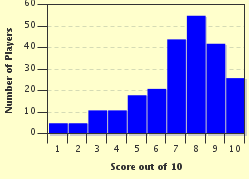Quiz Answer Key and Fun Facts
1. You're standing in front of a beautiful cathedral, admiring the Gothic architecture, when two young women approach you. "Excusez-moi," one of them says. "Pourriez-vous prendre une photo pour nous?" You try to understand, but her meaning just isn't clicking in your mind. How can you tell her you don't speak her language?
2. You're at a restaurant in St. Petersburg, about to start on a large bowl of bright pink soup. Suddenly, your waitress appears again - is something wrong? "Prijatnovo appetita!" she says. How do you tell her that you don't understand?
3. You're in a station in Delhi, sipping a mango lassi, when a man approaches you. "Yeh tren kidhar jaati hai?" he asks. How can you tell him that you don't speak his language?
4. You've just arrived at the Egyptian Museum in Cairo, and you can hardly wait to get inside. The friendly young man at the ticket booth greets you with, "Marhaban!" How can you ask him whether he speaks English?
5. You're on a sidewalk in Rome, craning your neck to take in the whole Colosseum. It's magnificent! You're surprised to be approached by a woman and her child. "Mi scusi," she says, "dove sono i gabinetti?" How will you tell her that you don't speak her language?
6. You've finally arrived at Narita International Airport after a very long flight and you're eager to leave the terminal, but there seems to be a holdup. The man in front of you turns and says, "Shosho omachi kudasai." How can you tell him that you don't understand?
7. You're at a train station, hoping to travel today, but you're not sure how to go about it. Some electronic booths say "Fahrkarten"; others say "Geldautomat." There's a sign with times and destinations, but also a "Gleis" column you can't interpret. Maybe you can get help from the woman at the Reisezentrum. How do you ask her whether she speaks English?
8. You've dreamed of visiting the Forbidden City, and you're finally in Beijing, China - but you need directions. Luckily, there are some friendly-looking passersby. How can you ask them whether they speak English?
9. You've just sat down at a restaurant in Zanzibar, Tanzania, weary from your travels. A waiter comes up to you, smiling, and asks, "Utapenda kunywa nini?" How will you tell him that you don't speak Swahili?
10. You've just collected your luggage after a long flight to Mexico City, and you're anxious to leave the airport. There's only one person stopping you: an official asking, "¿Tiene algo que declarar?" How can you tell her that you don't understand?
Source: Author
CellarDoor
This quiz was reviewed by FunTrivia editor
trident before going online.
Any errors found in FunTrivia content are routinely corrected through our feedback system.

